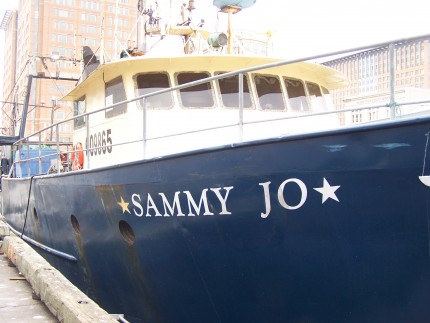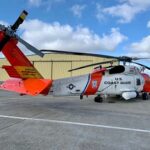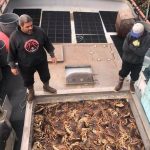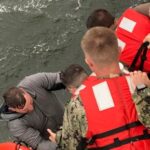Tag Archives: Gulf of Maine
Message to Maine fishermen: Adapt to climate change – The Gulf of Maine has experienced significant warming over the past 40 years
The Gulf of Maine has experienced significant warming over the past 40 years, said biologist and ecologist Andrew Pershing of the University of Maine/Gulf of Maine Research Institute. Since 2004, the warming has accelerated to 10 times the rate of previous years. continued@portlandpress
Marine experts: Gulf of Maine has become a cod-forsaken place, endangering all fisheries

“Big fish are ecologically extinct,” Steneck said of the Gulf of Maine ecosystem. “They’re not absent … but in terms of an ecological presence, they’re extinct.” The same warmer ocean temperatures that have helped push cod populations north, Steneck said, have provided lobster with a deeper range in which to settle their larva. Sea surface temperatures in the North Atlantic were the highest ever recorded in 2012, following years of historically rapid warming.
“We had a big red hake fishery 30 or 40 years ago,” testified veteran Rhode Island fisherman Rodman Sykes during a morning panel discussion. “We’d fill our boats with them. … We didn’t know where they went. I learned today they came up here [to Maine].” continued@portlandpress
The Gulf of Maine has experienced significant warming over the last 40 years “It’s unlike anything we’ve ever seen before,” Will Enviro’s continue to blame?
 Maine’s fishermen must be better informed, more communicative about conditions on the water and responsive to change to survive the constant shifts brought by a warming climate and water that is growing warmer and saltier. That was the message from about 100 marine biologists, fisheries managers, commercial fishermen and others who shared both scientific findings and anecdotal observations on the changes that are occurring in the Gulf of Maine. continued@kennebecjournal
Maine’s fishermen must be better informed, more communicative about conditions on the water and responsive to change to survive the constant shifts brought by a warming climate and water that is growing warmer and saltier. That was the message from about 100 marine biologists, fisheries managers, commercial fishermen and others who shared both scientific findings and anecdotal observations on the changes that are occurring in the Gulf of Maine. continued@kennebecjournal
Fisherman Survival, Perverted ENGO Logic, and another NOAA/NMFS Fumble. Plan to reopen New England fishing spots debated
BOSTON (AP) – A plan to allow certain New England fishermen back into fishing grounds where they’ve long been banned was so objectionable to environmentalists that two groups sued to kill it months before it was officially released. And after the proposal was unveiled last week, fishermen who once backed the idea called the plan a useless gesture that does nothing for their struggling industry. None of the criticism surprises the Northeast’s top fishing regulator, John Bullard. But he says it doesn’t mean the proposal to reopen 3,000 square miles of Atlantic Ocean can’t work. “We recognize it’s probably not going to make anyone happy,” Bullard said. But, he added, “We think it’s a responsible way to make abundant stocks accessible to people.” continued@myfoxboston
Abbot Library to host ‘Lobsters vs. Cod: Insights into the lobster boom in the gulf of Maine”
Lobster populations have been increasing consistently over the past two decades and now constitute one of the most valuable fisheries in the United States. Based on research in the coastal waters of the Gulf of Maine, Professor Grabowski’s talk will explore the roles of management and herring bait use, in paving the way for this uptick in lobster abundance. Then, the collapse of groundfish populations, such as Atlantic Cod, will be considered. This development has influenced not only lobster survival, but, in addition, has impacted lobster behavior. Collectively, each of these changes has contributed to the recent expansion of the iconic New England lobster fishery. continued @ Boston Globe
Gloucester: Confronting a crisis – Fishermen shift focus; Tierney renews push for federal aid
![]() Joe Orlando, captain of the mid-sized dragger Padre Pio and president of the 35-boat Gloucester trawl sector, was modifying his nets to keep them closer to the bottom as he shifts his fishing focus from the iconic cod and haddock to dabs — smallest of the flatfish, which burrow in the sand and mud of the Gulf of Maine. He and the rest of the day boat fishermen preparing for the bittersweet opening June 1 of hundreds of nautical miles of water that was closed to fishing through May. continued
Joe Orlando, captain of the mid-sized dragger Padre Pio and president of the 35-boat Gloucester trawl sector, was modifying his nets to keep them closer to the bottom as he shifts his fishing focus from the iconic cod and haddock to dabs — smallest of the flatfish, which burrow in the sand and mud of the Gulf of Maine. He and the rest of the day boat fishermen preparing for the bittersweet opening June 1 of hundreds of nautical miles of water that was closed to fishing through May. continued
Excellent Article: Fishing the Gulf of Maine: Tradition at a Crossroads By Michael Sanders
When most of us go down to the coast, whether to walk or swim or fish or sail, we take for granted what we see before us. We see the lobster boats and the colorful buoys marking the strings of traps, the bobbing green and red cans marking safe passage, the gulls and other seabirds. In the larger working harbors like Portland and Stonington and Port Clyde, there might be draggers tied up, unloading fish they’ve caught far out in the Gulf of Maine and on Georges Bank. What we don’t realize,,,,,,,,continued
New robotic instruments to provide real-time data on Gulf of Maine red tide
Phys.org – A new robotic sensor deployed by Woods Hole Oceanographic Institution (WHOI) in Gulf of Maine coastal waters may transform the way red tides or harmful algal blooms (HABs) are monitored and managed in New England. The instrument was launched at the end of last month, and a second such system will be deployed later this spring. continued
Read more at: http://phys.org/news/2013-05-robotic-instruments-real-time-gulf-maine.html#jCp
Gulf of Maine shrimp season a bust
 Gary Libby, a fisherman in Port Clyde, said he caught 800 pounds of the small, sweet shrimp on his best day this winter. Last year he averaged 2,000 pounds a day. “We were expecting it to be bad going in, but we weren’t expecting it to be as bad it was,” he said. Shrimp provide a small but important fishery for New England fishermen each winter. About 90 percent of the annual harvest is caught by Maine boats, with New Hampshire and Massachusetts fishermen accounting for the rest. continue
Gary Libby, a fisherman in Port Clyde, said he caught 800 pounds of the small, sweet shrimp on his best day this winter. Last year he averaged 2,000 pounds a day. “We were expecting it to be bad going in, but we weren’t expecting it to be as bad it was,” he said. Shrimp provide a small but important fishery for New England fishermen each winter. About 90 percent of the annual harvest is caught by Maine boats, with New Hampshire and Massachusetts fishermen accounting for the rest. continue
Changing ecosystem concerns fishermen – the Gulf of Maine is getting warmer and more acidic
 Scientists aren’t sure yet how the trend, which is believed to be tied to human-induced climate change, will affect ocean life in the gulf. But there is rising concern — especially among fishermen — that changes in the ocean ecosystem could severely damage some of the fisheries that are the backbone of the region’s seafood industry. Read more
Scientists aren’t sure yet how the trend, which is believed to be tied to human-induced climate change, will affect ocean life in the gulf. But there is rising concern — especially among fishermen — that changes in the ocean ecosystem could severely damage some of the fisheries that are the backbone of the region’s seafood industry. Read more
Cod quota rollover is tightened, too – “we intend to allow just under 2 percent” John Bullard
 NOAA Regional Administrator John Bullard has agreed to extend a 10 percent carryover of uncaught fishing quota to the new fishing year — for all stocks except the Gulf of Maine cod, for which a carryover and potential bycatch would account for fishermen’s total catch under dire new catch limits due to take effect May 1. ”For all allocated groundfish stocks, except Gulf of Maine cod, where the stock remains in poor condition and there is a high risk of exceeding overfishing limits, we intend to continue to allow fishermen to carryover up to their full 10 percent unused quota in 2013,” he said. “For Gulf of Maine cod we intend to allow just under 2 percent carryover in 2013 to avoid a risk of exceeding the overfishing limit. Read more
NOAA Regional Administrator John Bullard has agreed to extend a 10 percent carryover of uncaught fishing quota to the new fishing year — for all stocks except the Gulf of Maine cod, for which a carryover and potential bycatch would account for fishermen’s total catch under dire new catch limits due to take effect May 1. ”For all allocated groundfish stocks, except Gulf of Maine cod, where the stock remains in poor condition and there is a high risk of exceeding overfishing limits, we intend to continue to allow fishermen to carryover up to their full 10 percent unused quota in 2013,” he said. “For Gulf of Maine cod we intend to allow just under 2 percent carryover in 2013 to avoid a risk of exceeding the overfishing limit. Read more
Alarmingly warm water in Gulf of Maine bringing changes
Officials have suggested that higher temperatures in the gulf have been a factor in bacterial outbreaks in bivalves and in sea lice infestations in Cobscook and Passamaquoddy bays. Some have put partial blame on the gulf’s warmer waters for a northeasterly shift of cod in the gulf into colder waters, for declining shrimp catches and for the glut of soft-shell lobsters this past summer that plummeted prices lobstermen were receiving for their catch. http://bangordailynews.com/slideshow/alarmingly-warm-water-in-gulf-of-maine-bringing-changes/

Feds consider opening New England Closed fishing areas. National Oceanic and Atmospheric Administration would still have to approve.
BOSTON (AP) — There are five zones off the New England coast drawn in varying angles and shapes, all rich with fish, or at least they were at one time. It’s why regulators looking to preserve valuable species closed these areas to certain kinds of fishing year-round, beginning in the 1990s. Two decades later, a fishing industry in crisis wants to get back in. http://www.seacoastonline.com/articles/20121215-NEWS-121219828
Northern shrimp in the Gulf of Maine season slashed 74pc by the ASMFC
The Atlantic States Marine Fisheries Commission (ASMFC) this week set the season’s shrimp catch limit at 1.38 million lbs — down from 5.3 million lbs in 2012 — to protect the shrimp population from overfishing and the effects of higher water temperatures. http://fis.com/fis/worldnews/worldnews.asp?l=e&ndb=1&id=57324
http://www.newburyportnews.com/local/x520556227/Maine-Fisheries-sharply-reduces-shrimp-harvest
Cape Cod scallop fleet cries foul
Much of the best fishing terrain lies in and around the Great South Channel that separates Georges Bank from the mainland, and north in the Gulf of Maine, according to the council’s habitat study, and is listed as a likely site for closure or restrictions. Requiring these new habitat protection zones could be considered as an ecological trade-off for allowing fishermen access to areas currently closed to most fishing, according to the council. http://www.capecodonline.com/apps/pbcs.dll/article?AID=/20121115/NEWS/211150334
Maine Voices: Diversity, versatility important to future health of fisheries
By PATRICK SHEPARD
In light of the recent disaster declaration for the New England groundfishery, fishermen and managers need to begin planning for the future of this important industry to ensure that affordable opportunities exist for young fishermen as groundfish stocks rebuild. Let’s fast-forward, for a moment, to when populations of cod and haddock are commercially abundant off Maine’s coast once again. What will this mean for local fishermen? The shocking, short answer is that most Maine fishermen won’t have the rights to be able to catch those fish. While there’s been a lot written about the high abundance and low price of lobsters this year, one thing that hasn’t been discussed is that most of the fishermen in this state don’t have the federal permits required to catch anything other than lobster.http://www.pressherald.com/opinion/diversity-versatility-important-to-future-health-of-fisheries_2012-10-05.html
Paul Cohan – F/V Sasquatch Shift of fishing closure gives hope
To the editor:
Hats off to John Bullard and the Northeast Seafood Coalition (“NOAA backs off gillnet closure,” Page 1, Gloucester Daily Times, Sept. 27).
How is it that the coalition, with far fewer resources and access to data, devised an acceptable alternative that the National Oceanic and Atmospheric Administration grudgingly accepted with less than 96 hours to go before the closure went into effect? http://www.gloucestertimes.com/opinion/x708369977/Letter-Shift-of-fishing-closure-gives-hope
Bullard – Harbor Porpoise – Will Announce Decision Wednesday at NEFMC Meeting – Sept. 26 at 1:15 pm – LISTEN LIVE!
Mr. Bullard has stated that he will announce whether he has decided to change NOAA’s position Wednesday, Sept. 26 at 1:15 pm at a New England Fishery Management Council meeting in Plymouth, Massachusetts.
LISTEN LIVE https://www4.gotomeeting.com/register/423548903
Related posts
Abundance of Squid Leads to New Commercial Fishery in Maine – mpbn
The changing climate may be responsible for the emergence of a new commercial fishery in Maine. Earlier in the summer we heard a lot about the abundance of early-appearing soft-shelled lobster. Well, the warmer months also bought a lot of squid into Maine waters — much more than usual.http://www.mpbn.net/Home/tabid/36/ctl/ViewItem/mid/3478/ItemId/23770/Default.
Sea Surface Temperatures Reach Record Highs on Northeast Continental Shelf
During the first six months of 2012, sea surface temperatures in the Northeast Shelf Large Marine Ecosystem were the highest ever recorded, according to the latest Ecosystem Advisory issued by NOAA’s Northeast Fisheries Science Center (NEFSC). http://www.nefsc.noaa.gov/press_release/2012/SciSpot/SS1209/











































